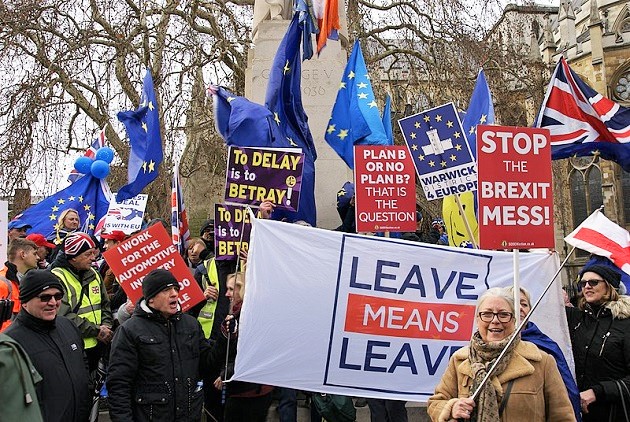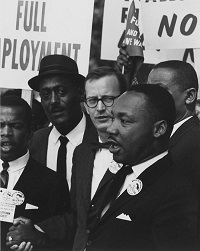The Brexit crisis has overwhelmed almost everyone who cares about the issue and the feelings of exhaustion and confusion seem unbearable. The temptation now is to switch off and go to sleep.
 Pro and anti-Brexit protesters in London. / Chiraljohn (Wikimedia Commons, CC)
Pro and anti-Brexit protesters in London. / Chiraljohn (Wikimedia Commons, CC)
The Brexit crisis has overwhelmed almost everyone who cares about the issue and the feelings of exhaustion and confusion seem unbearable. The temptation now is to switch off and go to sleep, hoping the politicians and civil-servants will at some point come to some solution. But herein lies the danger with disengaging. Dealing with a crisis (whether personal or political) by disengaging seldom bears good fruit. As citizens we have a duty to engage and make our voices heard. Martin Luther King Jr preached these words in a sermon: ‘History will have to record that the greatest tragedy of this period of social transition was not the strident clamour of the bad people, but the appalling silence of the good people.’
In what ways can Christians engage in politics in times of political crisis? Let me make a few suggestions.
Firstly, Christians view the world from a different vantage point, not limited to what is materially and historically given. We question things and reject what non-Christians take as given. We believe God is at work in our world and therefore we must critically evaluate what politicians say and do. All political decision-making is based on moral presuppositions about the world. When a politician says something or a committee of public officials make decisions about a civic matter, the hidden ‘invisible’ part of the equation of what is going on includes metaphysics and teleology. There are worldview issues at play. As Christians we must critically engage with these deeper issues. Often big ideologies like liberal capitalism or socialism take for granted certain presuppositions and hide their own deterministic thinking. Exposing and delegitimising false ideas and upholding God’s true plumb-line for society revealed in Scripture is one way Christians can engage in politics.
 Martin Luther King at a rally in 1963.
Martin Luther King at a rally in 1963.Secondly, Christians must constantly remind and alert the wider public that the state is not sacred and politics must be limited to its proper place. The state is a unique social construct, with legitimate God-given authority to exercise power using coercion. The law of the state has disciplinary power. But this means that in times in crisis, there is great danger that the state becomes idolized as the source of earthly salvation. Politicians are tempted to speak like a shaman making claims that they have the power to perform miracles and give the public what they want. But this is a lie. If we are not careful, times of crisis can lead to a kind of nationalistic frenzy and hard patriotism, demanding of citizens uncritical self-sacrifice and hatred of others not belonging to one’s own group. Christians must always take a stand against the demonisation of our fellow-human beings, especially outside our national borders. All human beings are made in God’s image and we must uphold the dignity of all people. No matter what the crisis, we must reject and condemn any kind of politics that uses hatred as a means for achieving anything. By seeking to limit the scope of our politics to its proper place we affirm our ultimate loyalty to One greater than the state.
Thirdly, Christians are called to be peacemakers. What this means is that we reject the ‘us-vs-them’ politics and affirm the centre ground. We ought to challenge our leaders to pursue the path of compromise. Unfortunately the opposite happens during times of crisis. The ideologically pure at the extremes of both the left and right will try and seize the opportunity to impose their unrealistic agenda on the rest of society. But this will only lead to further problems. Why? When one extreme has its way, it will provoke a strong reaction from the extreme on the other side, leading to further instability and clash.
Therefore it is important for Christians to loudly legitimise the politics of compromise for the sake of the common good. This will be more time-consuming, more complicated and less attractive but in the end it will produce better results.
Finally, Christians must regularly pray for all our political leaders, including the ones we disagree with. Politics is really about using limited means for achieving human ends. It is an enterprise fraught with setbacks and failures. Politicians are also people just like anybody else in society, and are trying to do a difficult job. There are no quick-fix or ultimate solutions to the fundamental problems of human nature.
But as Christians we know that prayer is possible only because we have hope in Christ. Without hope we become enslaved to pessimism and apathy. But through prayer we turn our backs on disengagement and walk forward into God’s promised future for the world. God puts the world right through the prayers of his people.
So no matter what is happening in society, and no matter how discouraged or confused we may feel, disengaging from politics should never be an option for us. We must pray, we must speak up, we must act. The grace of God to engage does not ebb and flow in our lives based on what is happening in times of crisis. Indeed, it is in those times of crisis that the Christian is called to make a difference, if difference means anything at all.
Philip S. Powell manages the Learning Community of the Jubilee Centre.
This article first appeared on the Jubilee Centre website and was republished with permission.

Las opiniones vertidas por nuestros colaboradores se realizan a nivel personal, pudiendo coincidir o no con la postura de la dirección de Protestante Digital.
Si quieres comentar o